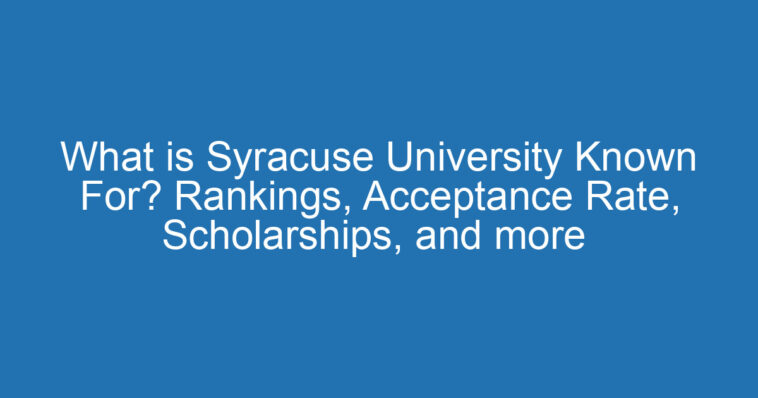Syracuse University is a private research university located in Syracuse, New York. It is commonly referred to as S.U. or just Cuse and was established in 1870. It was initially associated with the Methodist Episcopal Church until 1920 when it became non-sectarian.
This prestigious institution has a city setting with a campus size spanning 721 acres. It utilizes a semester-based academic calendar. Syracuse University ranked 62nd in the 2023 edition of Best National Universities by U.S. News. Syracuse University has over 300 majors and minors in thirteen different schools, including in science and engineering, business, arts, and public health.
Syracuse University pairs the resources of a private research university with the benefits of a procreative college. Small class sizes are the norm, and staff members are accessible and approachable. Syracuse has an average class size of 25 students with a student-to-faculty ratio 15:1.
Students are automatically admitted into any of the university’s schools when admitted. There are given two full years to pick a major. The 200+ majors at Syracuse are dispersed between the College of Art and Sciences, School of Education, School of Architecture, The College of Engineering and Computer Science, The David B Falk College of Sports and Human Dynamics, College of Law, School of Information Studies, Maxwell School of Citizenship and Public Affairs, The Martin J Whitman School of Management, College of Visual and Performing Art, S I Newhouse School of Public Communication, College of Professional Studies and Graduate School.
Syracuse University Ranking

As a coveted institution of higher education, Syracuse University has excellent ranking positions on various universities’ ranking pages. Syracuse University is one of the top private universities in the United States.
In a recent publication, Syracuse University was listed as one of the nation’s top universities in the new rankings from U.S. News & World Report. In the U.S. News Best Colleges 2022-2023 edition, Syracuse ranked No.62 among the nation’s top National Universities list and No.79 on the list of Best Value Schools.
In the world ranking, Syracuse University is ranked #751 in the Q.S. Global World Rankings 2022-2023 edition. Other ranking indices are:
- Syracuse University ranked #75 in the 2022-2023 edition of Best Undergraduate Engineering Programs
- Syracuse University ranked #34 in the 2022-2023 edition of Best Colleges for Veterans
- Syracuse University ranked #30 in the 2022-2023 edition of Most Innovative Schools
- Syracuse University ranked #197in the 2022-2023 edition of Top Performers on Social Mobility
- Syracuse University ranked #9 in the 2022-2023 edition of Best Study Abroad University
Syracuse University Acceptance Rate
Getting admitted into Syracuse University can be competitive, considering her alumni network’s pedigree and overall prestige. Meeting Syracuse’s SAT/ACT requirements is very important to get past their first round of filters and prove your academic preparation.
As of 2023, Syracuse University’s acceptance rate is 68.7%. This proves that the university can be selective when it comes to admitting students, and you’d have to submit an impressive resume to have a chance of studying at the coveted Syracuse University of New York.
Syracuse University Admission Requirement

Getting admitted to Syracuse University can be quite the ride; having a 68.7% acceptance rate, it ranks among the lowest rate of acceptance in the state. Syracuse University has, in place, high requirements for admission test scores and would admit students who score above this. Typically, Syracuse accepts and attracts students above average in their high school, with most incoming freshmen graduating in the top half of their high school classes.
ACT Scores Requirements
Available admission data indicates that Syracuse normally accepts students with ACT scores of 28 and above. Successful applicants send ACT scores above the average score for the year nationally. It is estimated that the school accepts minimum ACT composite scores of around 26 in some instances. Candidates submitting an ACT composite of 28 or higher would be in the upper half of applicants, and students with a 32 and above have very likely chances.
SAT Scores Requirements
Syracuse University prefers applicants to be in the top 45 percent of SAT takers. The school consistently takes their SAT composite scores down to 1260 on a 1600 scale, which admission should be considered attainable. Some students could be accepted with an SAT score as low as 1220. The average SAT composite for admitted freshmen in Syracuse is 1280 out of 1600.
Syracuse University Location

Syracuse University is set on a campus that has an eclectic mix of buildings, ranging from nineteenth-century Romanesque Revival structures down to contemporary buildings designed by renowned architects such as I.M. Pei. The main campus has a grass quadrangle and outdoor sculptures. It offers students the amenities of a traditional college experience. The university overlooks a medium-sized city, which provides the students with a beautiful overview.
The university also owns an on-campus Sheraton Hotel, a Marshall Square Mall, the Drumlins Country Club, which serves as a nearby 36-hole golf course to the east of their South Campus, the Marshall, which is another 287-bed student housing complex, the Fisher Center and last but not least Joseph I. Lubin House in New York City. The school also houses the Paul Greenberg House in Washington, D.C., the Minnowbrook Conference Center( 28-acre) retreat in the Adirondack mountains of Upstate New York, and various other properties surrounding its University Hill campus.
Syracuse University Notable Alumni
Syracuse University has produced some notable and influential names, which include;
- Joe Biden: 46th President of the United States
- James B Cunningham: former U S Ambassador to Afghanistan
- Kathy Hochul: Governor of New York
- Sultan bin Salman Al Saud: Saudi Prince
- Al Wadeed bin Talal: a member of the Saudi Royal family
- Eilee Collin: first female space shuttle pilot
- Joyce Carol Oat: American Author
- Stephen Crane: American Writer
- Ted Koppel: Broadcast Journalist
- Bob Costas: American Sportscaster
- Peter Falk: actor
- Lou Reed: singer/songwriter
- Drew Taggart: artist; member of the Chainsmokers
Syracuse University Undergraduate Tuition and Fee
Given Syracuse’s extensive scholarship programs, the university pays, on average, 25% of the actual cost of tuition and fees for each of its students. The combination of these aid programs makes education at Syracuse affordable and never stops yielding returns.
Below is the 202-2023 cost of attendance for undergraduate students enrolled full-time at Syracuse University.
- Freshman Resident
Tuition & Fees- $58,440
Room- $10,000
Board- $7,140
Books- $1,200
Transportation- Variable
Miscellaneous- $1,695
TOTAL- $78,475
- Continuing Resident
Tuition & Fees- $58,440
Room- $13,110
Board- $7,140
Books- $1,200
Transportation-Variable
Miscellaneous- $1,695
TOTAL- $81,585
Syracuse University Scholarship

Syracuse University offers Merit-based scholarships which do not need to be repaid as a means of supporting undergraduate students by awarding scholarships through the Admissions Committee, which recognizes academic achievement regardless of financial need.
Upon admission submission, the Merit-based scholarship award is considered no, regardless of need. If you apply for need-based financial aid, your eligibility will be calculated based on your need after your merit scholarship has been applied to your aid package.
Syracuse University also awards tuition benefits that are tuition specific and may be combined with other awards, including those outside the school. For Syracuse University Dependent Tuition Benefit (DTB) eligible student who receives less than 100 percent benefit, the merit-based scholarship may be combined with your Dependent Tuition Benefit to cover the full tuition cost. If you receive a Tuition Exchange award, you will receive a merit-based scholarship in name only, as your scholarship would already be included in your Tuition Exchange or Dependent Benefit funding. For more information on their scholarship programs, click here.




